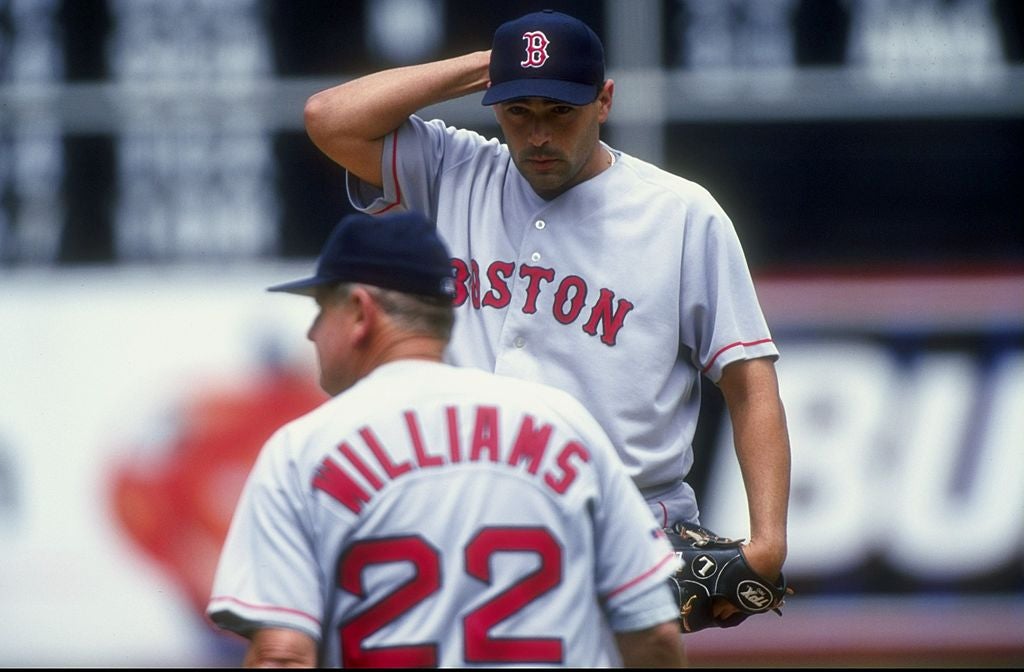Mazz: Remembering Jimy Williams
To me, when it came to remembering Jimy Williams, there was one story that stood out above all others

5 Apr 2001: Manager Jimy Williams of the Boston Red Sox watches the action during the game against the Baltimore Orioles at Camden Yards in Baltimore, Maryland. The Orioles defeated the Red Sox 2-1.Mandatory Credit: Doug Pensinger /Allsport
To me, when it comes to remembering Jimy Williams, there is one story that stands out above all others.
And it had nothing to do with at least temporarily benching Pedro Martinez in August 1999.
By the time Williams got hired to manage the Red Sox before the 1997 season, he hadn't managed since 1989, when he was fired by the Toronto Blue Jays slightly more than a month into the season. The Blue Jays were just 12-24 when they sent Williams packing, but his biggest regret in Toronto had been the way things ended in 1986, his first year managing the team.
That year, pitcher Dennis Lamp was in the final year of a three-year contract, though he had an additional inventive that could have earned him an additional $600,000 by guaranteeing his contract for a fourth year, 1987. Because Lamp had been pitching poorly, Jays management instructed Williams to effectively bench the player, thereby preventing him from reaching the necessary appearances to trigger the fourth year. Lamp filed a grievance that the club ultimately won.
So how does that relate to Boston?
During the same offseason Williams was hired, the Red Sox signed Steve Avery to a one-year contract with a vesting option for a second season, 1998. All Avery had to do was make 18 starts to trigger the second year, an incentive the sides agreed upon because the pitcher had been injured with Atlanta during the 1994-1996 seasons, where Williams had been the third base coach under Bobby Cox. The idea was that if Avery stayed healthy enough to pitch, his contract would be guaranteed for a second season.

30 Jul 1998: Pitcher Carlos Reyes #55 of the Boston Red Sox talks to manager Jimy Williams #22 during a game against the Oakland Athletics at the Oakland Coliseum in Oakland, California. The Athletics defeated the Red Sox 6-5. Mandatory Credit: Otto Greu
Simply put, Avery sucked in 1997, posting a 6.42 ERA. (He never again regained the form that made him an All-Star and Cy Young candidate early in his career.) In late August, after Avery's 17th start - one short of the 18th that would guarantee him $10 million for the 1998 season - the Red Sox instructed Williams to put Avery in the bullpen. Williams hated being put in the same spot as he was in Toronto, but he complied.
At least for a time.
On Sept. 25, with just four days remaining in the season, the Red Sox needed a starter for a game at Detroit. Williams chose Avery, whom most everyone regarded as a likeable, hard-working teammate. The news sent shockwaves through the Red Sox clubhouse and organization, the manager effectively writing a $10 million check from the team's account without the approval of his bosses, specifically general manager Dan Duquette (who hired Williams) and acting owner John Harrington. Williams had waited nearly eight years to manage again, but had despised the way things ended in Toronto, where he was called a puppet for ownership during the decision to bench Lamp.
The decision to start Avery actually came on Sept. 24, a day before the series finale in Detroit. That night, with the Red Sox en route to a fourth-place finish, I remember thinking that Williams was at risk of being fired. After the standard media session before the game, I went out to the field for batting practice and found Williams again as he was hitting ground balls not far from the first-base dugout. I asked him whether he feared that the decision could get him fired from a job he had waited eight years to secure.
He looked at me and shrugged, fully understanding that it was a distinct possibility.
For what it's worth, Avery pitched five scoreless innings in the Sox' 3-1 win over the Tigers the next day. During the winter, the Red Sox acquired Pedro Martinez from the Montreal Expos. Avery had a better year in 1998, winning 10 games as the Sox rode Martinez to the playoffs. Williams was named the runner-up for the 1998 American League Manager of the Year Award and won the honor in 1999, when Martinez powered the Sox to the American League Championship Series. Two years after that, late in the 2001 season, the Red Sox fired Williams despite a 65-53 record. The club then nosedived under Joe Kerrigan, at one point losing nine straight, 13-of-14 and 23-of-29.
Was Williams perfect? Like the rest of us, hardly. He was sometimes impossibly stubborn. He could also be downright hilarious. He could be surprisingly intense and insisted on sacrifice for the greater good, often (too much so?) taking a stand against star players (Martinez? Carl Everett? Dante Bichette?) who might have exhibited diva tendencies.
One of Williams' favorite catchphrases?
"I'm not trying to be right," he would say. "I'm trying to do right."
And that was pretty much how he operated.
Mazz: Happy New Year … same sad Red Sox?
Craig Breslow and the Red Sox have been together now for just a couple of months, but here are the questions: are these still the same old Red Sox? Is Breslow different from Chaim Bloom? Or did the Red Sox just try to hire a different version of the same guy?
Right now, it feels like the latter.
Yes, again, it's early. But we here in the Boston media are in the business of, as Theo Epstein once called them, "snapshot evaluations." It's really up to you whether you want to take this all with a grain of salt. But if we're looking at the first 60 days(ish) of Breslow the same way we might look at the first 100 days of an American Presidency, well, the policies look rather familiar. Breslow has been cost-conscious while emphasizing the long term over the short, which is to say that he's done exactly what Bloom did.
And while he may be doing it better, we won't really know that until later.
Nonetheless, after the Red Sox dealt Chris Sale to the Atlanta Braves over the weekend for second baseman(?) Vaughn Grissom, Bloom had his first press briefing of the offseason following what might be called a major move. The Red Sox paid a steep price for Sale when they traded for him late in 2016, an even steeper one when they foolishly re-signed him to a five-year, $145 million extension. They even paid $17 million of his remaining salary to trade him to Atlanta.
Was Sale worth it? Yes and no. In retrospect, let the record show that Sale's only full season in Boston was his first one - when he made 32 starts, struck out 308 batters and finished second in the American League Cy Young Award balloting. Obviously, the team then won the World Series in 2018. But Sale has been largely a non-factor since, finishing his Red Sox career with 115 starts over seven seasons, an average of just 16 per year.
So, when Breslow did what Bloom failed to - rid the Sox of Sale's contract - well, yes, that qualifies as a big move.
In discussing the Sale (and Grissom) deal, Bloom addressed a number of issues from both the trade and his first two months as the Red Sox’ chief baseball decision maker during a media session that lasted less than 15 minutes. Here are a handful of the highlights, which feature the actual audio from the media session so that you can listen for yourself:
Breslow on why he traded Chris Sale
Just a couple of quick thoughts here. First, Breslow sounds an awful lot like Bloom when he points out that his job is to do what is in the best interest of the Red Sox in both the long term and the short term. So fine. But let's not kid ourselves. Grissom will turn just 23 on Jan. 5 and has no real major league track record to speak of. Before the offseason, Breslow addressed Sale's place on the club by suggesting they expected him to be a full-go in 2024. By paying much of Sale's salary, what the Red Sox did here was to effectively buy a player, which is exactly the kind of thing they should be doing.
One small thing to like? At the end of this comment, Breslow says of this move, "It was one thing that I needed to do." Got that? I. Call me crazy, but most executives speak in the context of we, especially early on in their tenures or careers. The fact that Breslow did not is potentially a good sign. Whether intentional or not, he's taking ownership of the decision. He's not placating people. It's a small thing, maybe nothing. But it stuck out.
Breslow's general thoughts on Grissom
There are an array of nuggets in this comment and we have more specifics coming, so let's stick to the generalities to start. The phrase "positional versatility" always makes me nervous, particularly when it relates to someone who can hit. Why? Because it speaks to defensive uncertainty. In 329 career minor league games, Grissom has batted .320 with an .884 OPS, 59 stolen bases and 32 home runs. He didn't strike out much and walked his fair share. If you count designated hitter, he's also played four positions - second base, third base, shortstop and DH. Interestingly, during Breslow's media session, he never once mentioned Grissom's defensive abilities (or lack thereof).
The good news? Grissom's offensive abilities seem to fit the modern game. He puts the ball in play, has some power, can run some. (Hence the term "dynamic athlete.") Breslow emphasized that the Sox have Grissom for "six years of control" - again, that's long term - and that the Sox considered him a part of their "core" of young players. If you ask me, Grissom feels like a better version of Nick Yorke, the soon-to-be 22-year-old who was Bloom's very first pick (first round, 17th overall) in the 2020 draft and now feels like trade bait.
Breslow's more specific thoughts on Grissom
The key phrase in this entire comment rests in those nine words at the very end: "We view him as someone that can play everyday." We view him. That's a projection. Remember that Grissom was a shortstop who struggled at that position defensively, so the Braves gave the starting job last season to Orlando Arcia, now a 29-year-old with a career .679 OPS. The Braves have 27-year-old Ozzie Albies at second base, where he posted an .849 OPS, 33 home runs, 109 RBI and 13 steals last season. So yes, Grissom was available. But how many teams trade away a young (read: cheap) player with great promise if they are fully sold on him?
One more thing - and we pointed this out yesterday: over the 2022-23 seasons, there were 74 second basemen who played at least 350 combined innings at the position. Grissom ranked 68th in outs above average behind, among others, Red Sox second baseman Enmanuel Valdez, who was terrible defensively. For a team that has been preaching improved defense, Grissom doesn't feel like an answer - at least not yet.
Breslow on Grissom's bat
Sense any recurring themes here? It starts with the bat. And versatility. And six years of control. All of that makes sense. The Red Sox believe that Grissom's bat plays, as Alex Cora might put it, but that value goes up exponentially if he can play second base at an adequate level. We'll have to see how that shakes out. Also, Grissom feels like he should hit more home runs than he does, so keep an eye on that - and on whether the Sox eventually end up tinkering with his swing.
I know we said this already, but Grissom feels like only part of the return for Sale. If the Sox end up moving someone like Yorke in a package for a good, young pitcher, the deal becomes Sale, Yorke and $17 million for Grissom and Pitcher X. Something like that could help the Sox in the short term at a place they are most desperate: the mound.
Breslow on Yamamoto
Wait, what does this have to do with the Sale trade? The answer: nothing. But it's also the first time anybody from the Red Sox has said something publicly about the pursuit of Yamamoto, who signed with the Los Angeles Dodgers. And Breslow didn't exactly inspire confidence with his answer. His suggestion that the sides didn't "align" suggests that Yamamoto either didn't want to to come to Boston or that the Red Sox weren't in the same financial universe - and neither is a good thing.
Don't let Breslow fool you. The Red Sox badly wanted this pitcher. Yamamoto either told them to pound sand or they didn't have the stomach to pony up. Or both. After Bloom reportedly balked at trading Sale (and dumping the money) because he didn't like the return, Breslow pulled the trigger. That's a good sign. But the fact that both were essentially looking to do the same thing is a little worrisome, especially amid recent reports that the Red Sox are still looking for ways to trim payroll.








